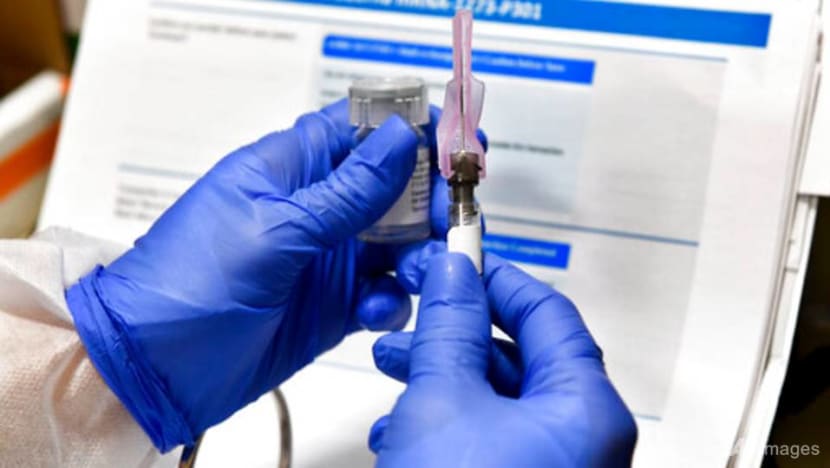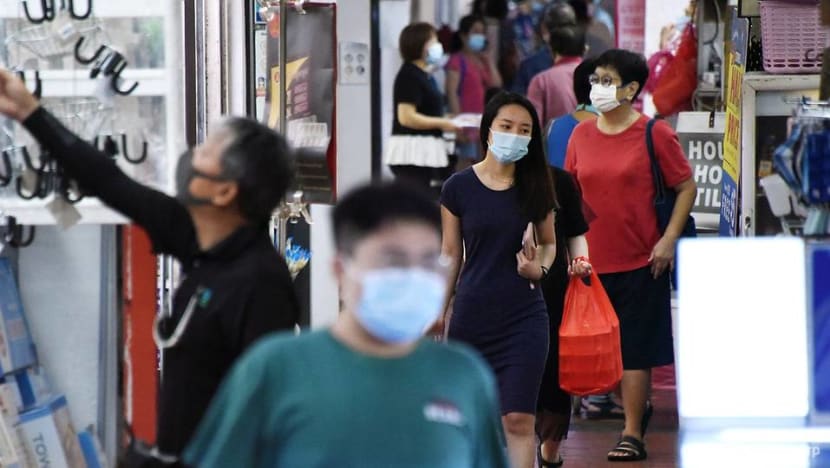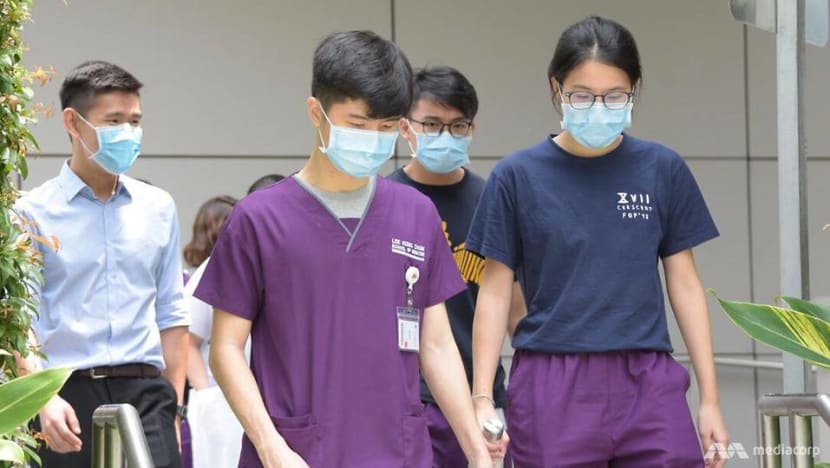commentary Commentary
Commentary: A vaccine is on the horizon. But most Singaporeans are adopting a wait-and-see attitude
Older Singaporeans too seem to be more hesitant about getting vaccinated, say Saw Swee Hock School of Public Health’s Assistant Professors Wee Hwee Lin and Hannah Clapham.

People wearing face masks at Marine Terrace on Sep 16, 2020. (Photo: Try Sutrisno Foo)
SINGAPORE: COVID-19 has completely altered our lives. There is a general anticipation life will return to some semblance normalcy with a COVID-19 vaccine.
Whether that is true remains to be seen, but vaccination will be an important step towards this goal.
We are now closer to that stage. After months of anticipation, one or two vaccines may soon enter mass production. This is an incredible feat of science.
READ: Commentary: Great news, the first approved COVID-19 vaccine is here. But don't throw away your masks yet
Moderna has announced a rolling review for its vaccine with the Health Sciences Authority, our regulatory body for health products. In addition, the Singapore Government has been working really hard to ensure that Singapore has access to these vaccines.
Singapore will work towards securing a portfolio of vaccines to cater to different segments of population, given the multiple factors that come into play regarding vaccine distribution including the lack of data concerning the sustainability of the immunity of particular COVID-19 vaccines, Health Minister Gan Kim Yong had said in November.
READ: Commentary: A COVID-19 vaccine in Singapore? Here's what has to happen first
CHALLENGES IN COVID-19 VACCINE DEPLOYMENT
Still, there are several challenges in deploying a COVID-19 vaccine.
Vaccines can protect the individual as vaccination reduces their risk of disease. They can also be used to create herd immunity, a situation where the number of people left to be infected is so small, the spread of the virus is curbed.
Challenges in vaccine deployment include deciding who gets priority for an initial limited doses of vaccines and how do we vaccinate enough to achieve herd immunity.
WATCH: At least 6 in 10 need COVID-19 vaccine to achieve herd immunity in Singapore: Experts | Video
THE BUSINESS COMMUNITY IN HIGH ANTICIPATION
But the focus on logistics and triage may have obscured attention to whether Singapore residents would unquestionably accept a vaccination if a programme were to be rolled out.

We are some time away from that exercise but a keen understanding of prevailing concerns about taking a COVID-19 vaccine among a sizable population could inform the public communications strategy.
To do that, we engaged stakeholders from the healthcare sector, government, academia, and business to discuss a broad range of issues relevant to a national vaccination programme.
Unsurprisingly, the business community is in high anticipation as a vaccine will allow businesses to operate with fewer restrictions and allow networking activities, a critical part of operations, to resume.
Showing a high level of confidence in the science, healthcare professionals and scientists we spoke to also noted that recent vaccine clinical trial data shows the vaccine to be safe.
READ: Commentary: Let’s switch from wanting to be COVID-free to becoming COVID-vigilant
However, all stakeholders recognised that mandating vaccination is not a practical approach. One participant suggested increasing vaccination uptake by tying it to incentives, for example, relaxing current workplace restrictions for businesses whose staff have been vaccinated. However, this may give rise to ethical issues if some workers refuse vaccination.
A survey of 515 respondents in September by Professor Eric Finkelstein at Duke-NUS Medical School found that 20 per cent or more respondents do not want to be vaccinated even if this is free.
More detailed, robust and nationally representative studies will be required but these statistics are bearing out in other preliminary surveys in Singapore. In our own pilot study using Facebook Survey involving 78 respondents, one in five also said that they will never want to be vaccinated.
READ: Commentary: Will people really refuse a COVID-19 vaccine out of fear?
SENTIMENTS AMONG FACEBOOK USERS TOWARDS COVID-19 VACCINES GENERALLY POSITIVE
Online chatter might not be representative of overall public attitudes but can provide a glimpse into what people are thinking.

In an analysis of COVID-19 related Facebook posts made by the three major English news outlets in Singapore (Straits Times, CNA and Today) over Aug 27 to Nov 27, Dr Aravind Sesagiri Raamkumar of the Saw Swee Hock School of Public Health analysed comments on 100 COVID-19 vaccine posts using both qualitative and quantitative techniques.
We found expressed sentiments to be generally positive, with two or more positive sentiments expressed for every negative sentiment.
Among the negative comments, there were discussions on conspiracies, concern over safety, opinions that vaccines are not needed as the death rate due to COVID-19 in Singapore has been very low, and greater confidence in the vaccines developed in certain countries compared to others.
READ: Commentary: So the vaccines are here, but how will they get to billions across the globe?
LIKELY NO MAD RUSH FOR THE VACCINE WHEN FIRST LAUNCHED IN SINGAPORE
The data suggests we are not expecting a mad rush for the vaccine when it is first launched in Singapore.
In our Facebook survey, the proportion of respondents who said that they are ready to be vaccinated any time, within three months, six months or 12 months from its availability in Singapore are 22 per cent, 11 per cent, 15 per cent and 32 per cent respectively.
This may be a good thing, as we can worry less about meeting a surge in demand and focus on distributing the initially limited quantity of vaccines to those prioritised first – like healthcare workers and the vulnerable.
READ: Commentary: What vaccine-led recovery? A double-dip recession looks more likely
But this relaxed view about vaccinating can be a double-edged sword because this means authorities will have to expend resources convincing the public to vaccinate individuals when the number of cases may still be low rather than wait for the number of cases to rise before getting vaccinated and let fear drive the desire to vaccinate.
As the number of cases rise, our healthcare facilities will have reduced bandwidth and capacity to vaccinate a large number of individuals. They need to focus on managing the COVID-19 cases.

This wait-and-see attitude is not a good strategy. A vaccine does not become safer just by us waiting it out.
At this stage, seeing how so many healthcare agencies and infectious disease experts are poring through the data to ensure the safety of the vaccine, any side effects that surface over the longer term are likely to affect only an extremely small number of individuals.
READ: Commentary: We can't give up on developing other COVID-19 vaccine candidates now
YOUNGER PEOPLE ARE MORE WILLING TO BE VACCINATED
Of all demographic factors that impact attitudes and willingness to get vaccinated, we have found age to be a key factor. In our survey, individuals aged 35 and younger are more likely to state that they are ready to be vaccinated anytime (42 per cent) compared to individuals aged 36 and over (13 per cent).
At the same time, individuals aged 36 and over are more likely to state that they will never get vaccinated (23 per cent) compared to individuals aged 35 and younger (17 per cent).
These findings gel with a previous study among adults aged 65 and over in Singapore regarding influenza vaccines by Professor May Oo Lwin at the Nanyang Technological University, where a perceived lack of vulnerability, fear of side effects, and trivialisation of influenza were reasons cited for not getting vaccinated.
Reasons for not taking the COVID-19 vaccine among the elderly may be different this time round. Anecdotally, there is a sense of vulnerability to COVID-19 among the elderly but the fear of side effects dominate.
READ: Commentary: Here's how our elderly can better protect themselves against COVID-19
MORE RESEARCH ON KNOWLEDGE, ATTITUDES AND BELIEFS TOWARDS COVID-19 VACCINES ARE NEEDED
Much work remains to be done urgently to better understand Singapore residents’ knowledge, attitudes and beliefs of the COVID-19 vaccines, so that scientists and the Government can help answer questions and respond to concerns.
Clear and accurate communication around the vaccines and their impact and safety will be vital to a successful vaccination programme.
READ: Commentary: Why rushing a COVID-19 vaccine could spell disaster
As residents, you too can play a part in this. Our Facebook survey had a roughly one in 10 response rate, which is comparable to many door-to-door surveys employed in public health studies but greater participation, particularly by reluctant respondents could unearth new viewpoints.
So the next time you are approached by a researcher for your opinion on COVID-19 vaccine, we hope you share your honest opinion.
Listen to infectious disease experts discuss what a COVID-19 vaccine rollout would look like:
BOOKMARK THIS: Our comprehensive coverage of the coronavirus outbreak and its developments
Download our app or subscribe to our Telegram channel for the latest updates on the coronavirus outbreak: https://cna.asia/telegram
Assistant Professors Wee Hwee Lin and Hannah Clapham are faculty members of the NUS Saw Swee Hock School of Public Health. Assistant Prof Wee is also the Director for the Centre for Health Intervention and Policy Evaluation Research, which conducts programme and economic evaluations to inform design of health services delivery and policy making.
















